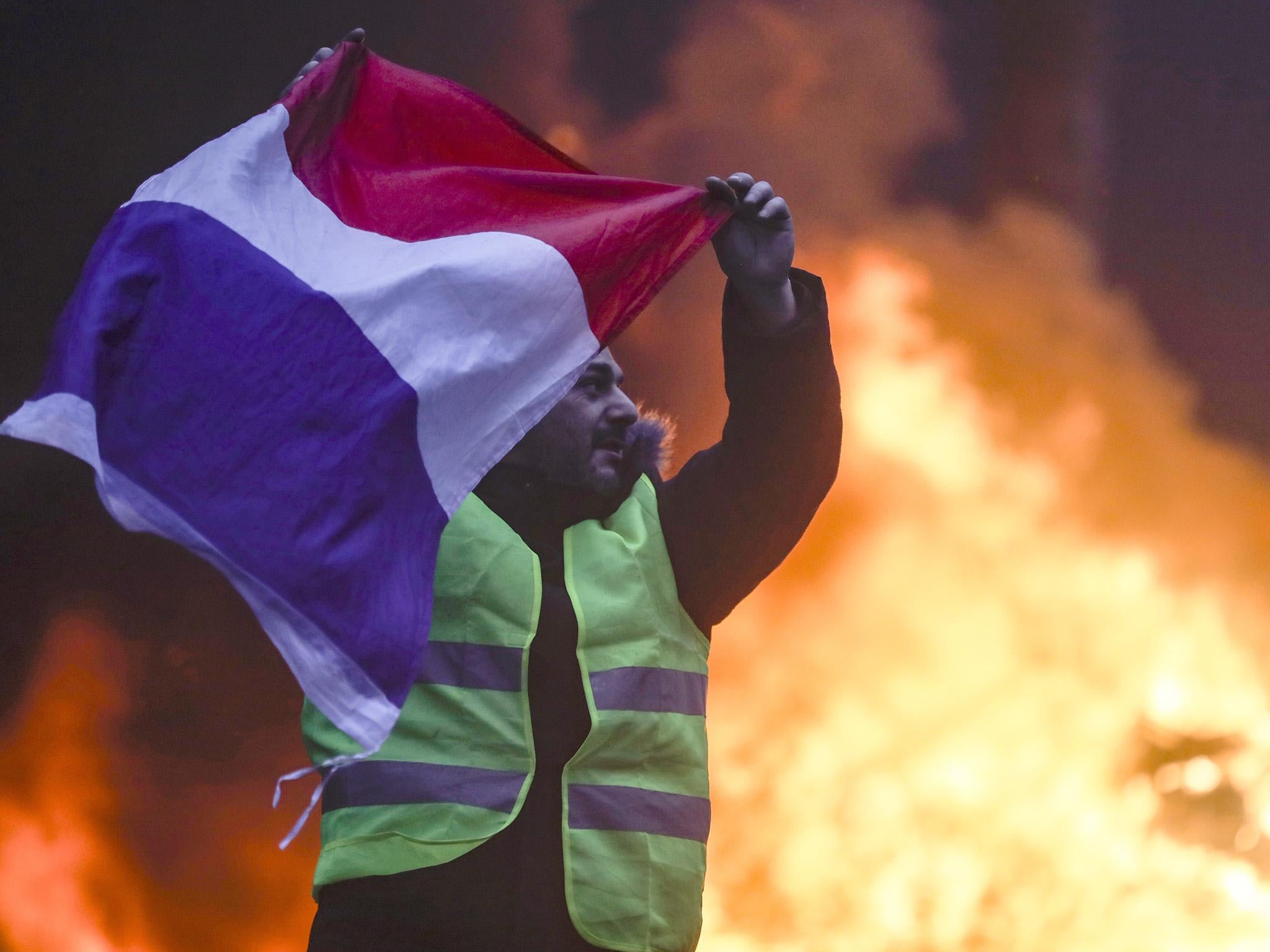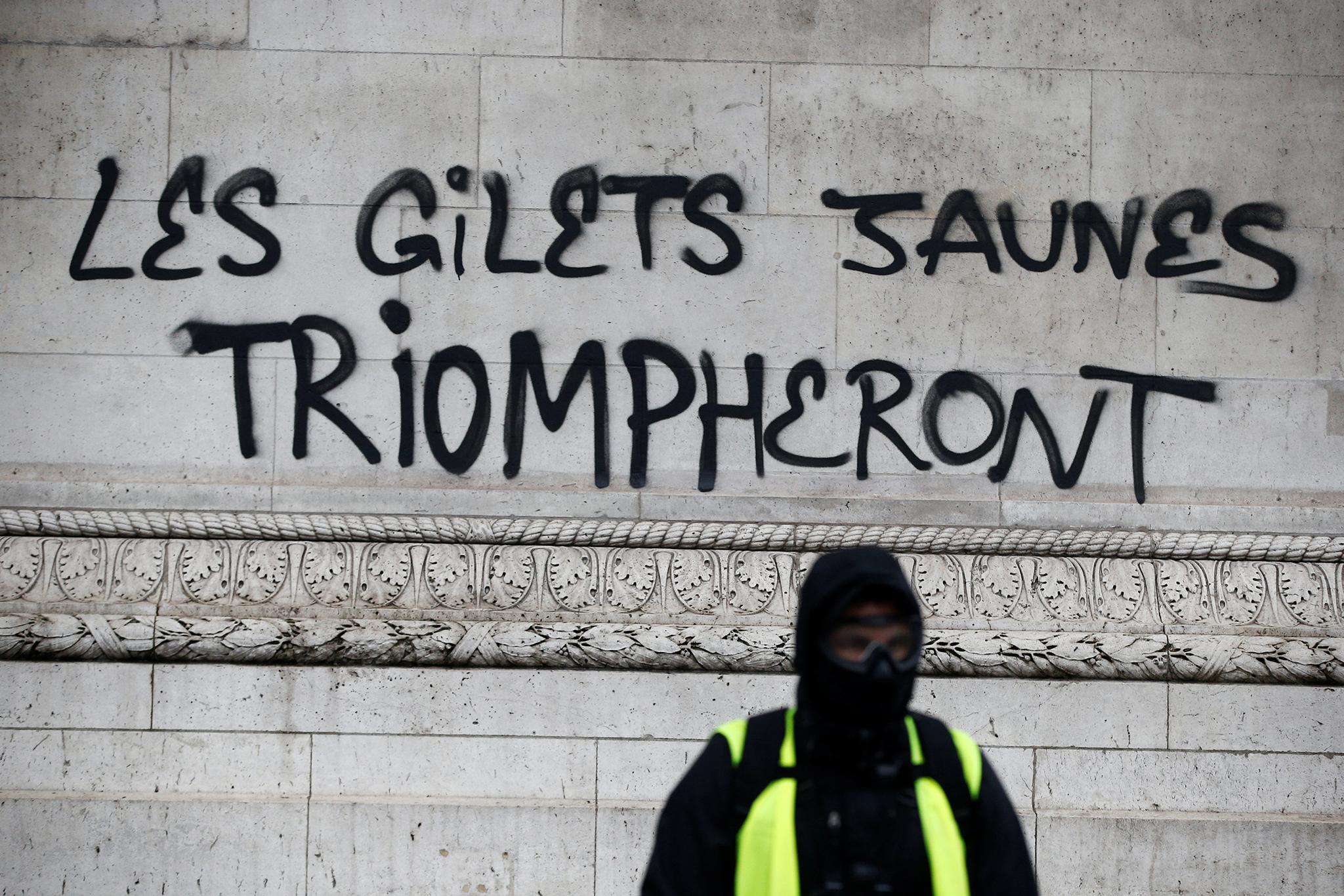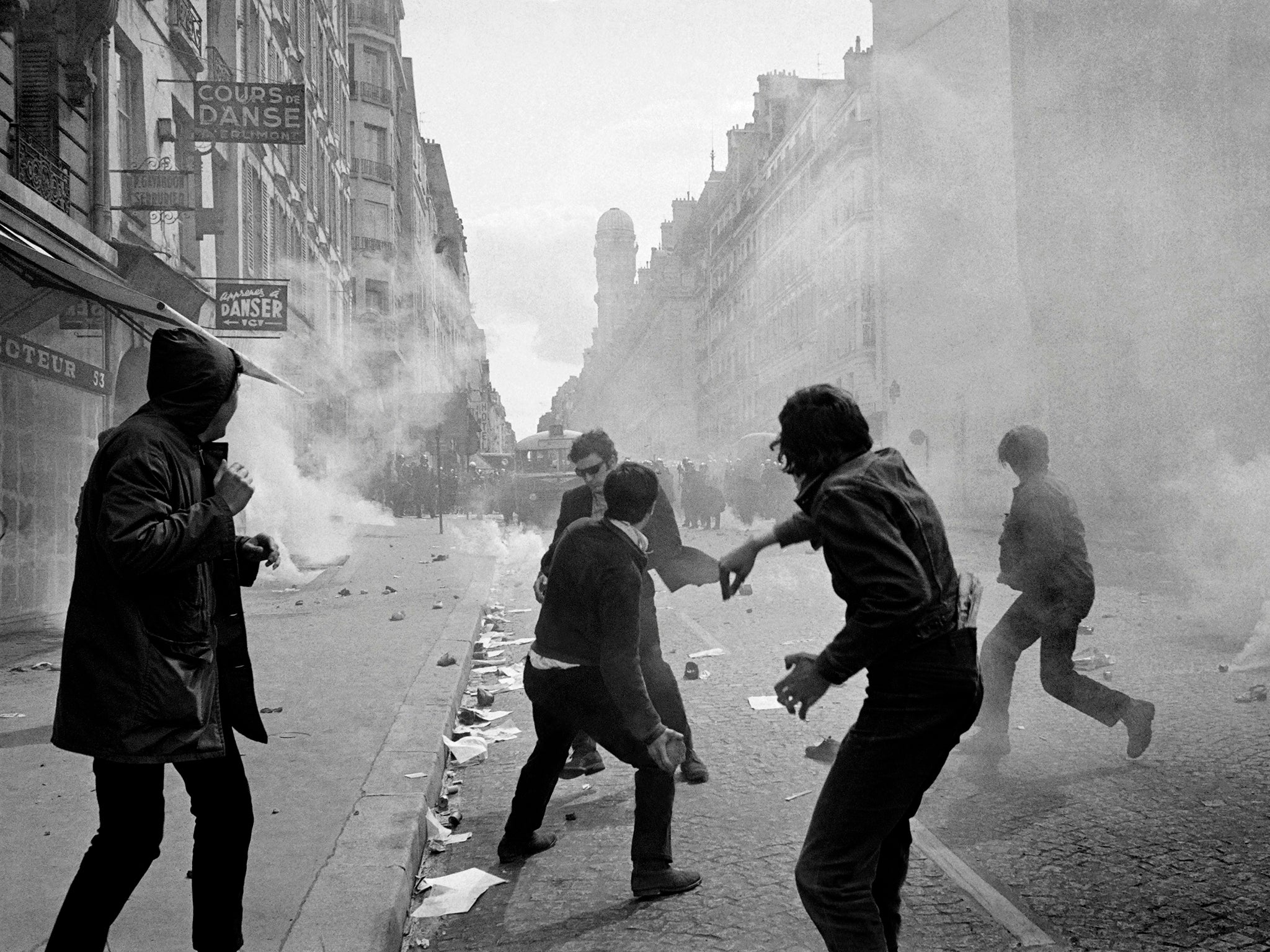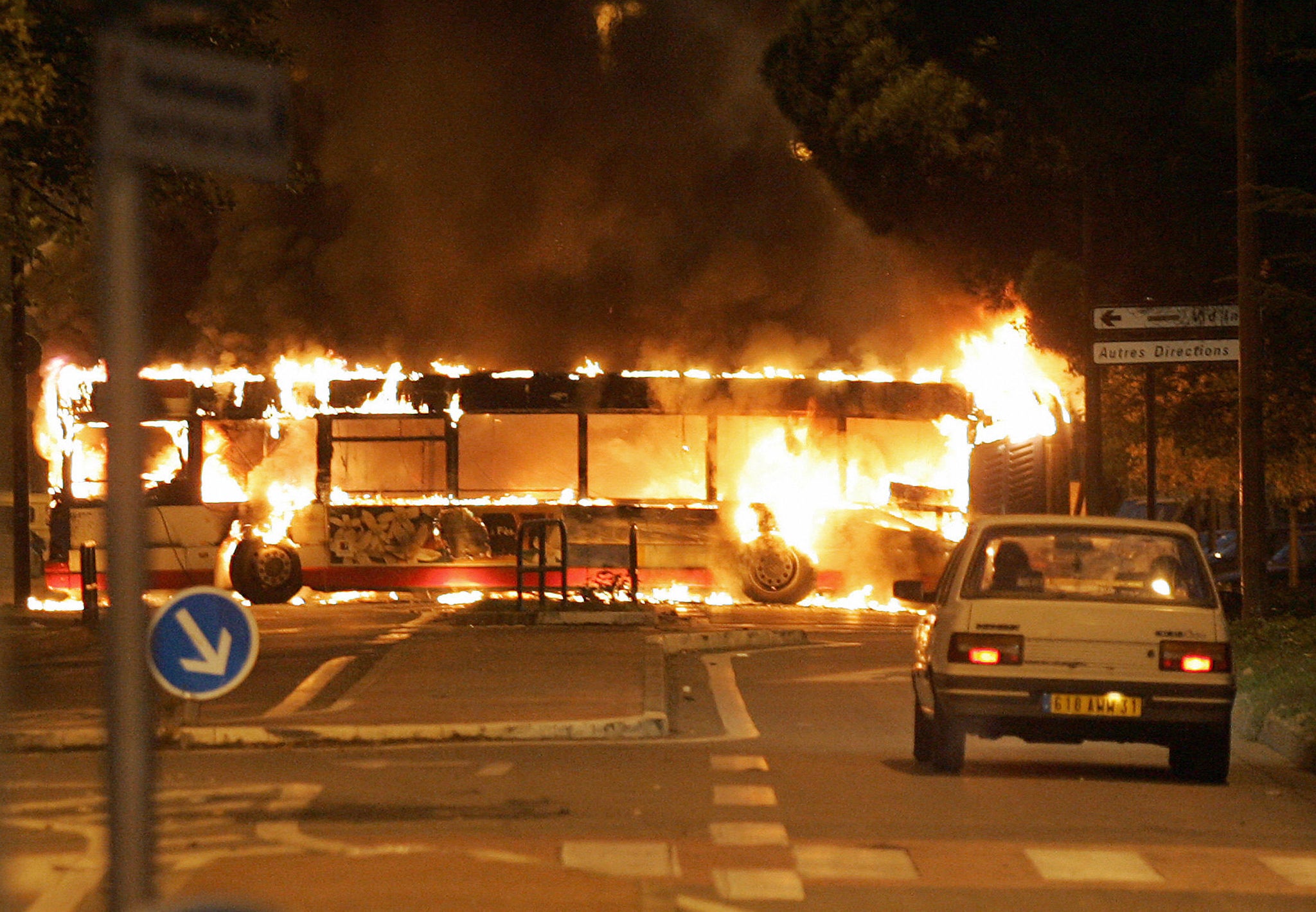Why the grievances of the gilets jaunes and Brexiteers need to be resolved in the same measured way
Emmanuel Macron and Theresa May must find non-extremist solutions to improve the conditions of the poorest. This will prevent the movements from taking a darker turn, as Arjun Neil Alim explains

They “stormed heaven”, taking over Paris until the government acted. Karl Marx’s depiction of the violent episode of the Paris Commune in 1871 offers an indication of how often the City of Lights has been bathed in blood.
Four weekends ago, protesters in yellow vests flooded the boulevards of Paris, ostensibly to protest against a “green tax increase” on petrol and diesel of four and seven cents per litre respectively. Demonstrations soon turned violent, with at least three killed and hundreds wounded around the country. The Arc de Triomphe was desecrated by graffiti.
Each weekend since, the protesters have been back, returning in large numbers to the streets of the main cities. The authorities have become increasingly better prepared to limit the damage, with extra security personnel employed to maintain the peace. Still, the violence has gone on.
What’s more, as time has gone one, the protests have morphed into a wider expression of anger against President Macron and have brought under their umbrella a broad coalition: radicals hate his elitism; socialists label him the “president of the rich”; social conservatives call him the “president of the cities”.
Some who opted to vote for the outsider in the 2016 presidential election see their anti-establishment champion as having transformed into an elitist insider. Just as many Brexit voters pinned their anger on a London elite, the gilets jaunes pin theirs on Macron, the man whose common touch appears to have deserted him.
The “gilets jaunes” (“yellow vest”) phenomenon, named as such for the high visibility jackets that drivers are obliged to keep in their vehicles, emerged seemingly from nothing. The echoes of the genesis of President Macron’s En Marche! movement have not been lost on political observers. It has little affiliation with any political party, even though some of its adherents voted for Marine Le Pen’s far-right National Rally or Jean-Luc Melenchon’s far-left La France Insoumise. It is largely made up of the suburban and rural lower-middle classes.
Unofficial gilets jaunes manifestos have baffled political commentators. The movement appears to mirror both the US Tea Party and Spain’s Podemos movement. Demonstrators on a single march, apparently united, called variously for the closure of parliament, “Frexit”, the abolition of political borders and lower taxes. There is little obvious coherence beyond anger at the status quo.

Edouard Louis, the acclaimed French author of The End of Eddy and History of Violence, compared the protesters to his chauvinist, working-class father who had trouble accepting his son’s homosexuality. His magnum opus, The End of Eddy, shocked much of France in its depictions of rural poverty and backwardness. For him, it is exactly these people who are trying to make themselves heard.
The reality is that there remains no political alternative to Emmanuel Macron. France’s traditional political parties are led by nobodies, and the far left and far right have failed to build a critical mass of support
On both sides of the Channel, the role of local grievances is noteworthy. In Britain, many of those who voted to leave the EU had seized on the immediate effects of austerity – such as the closure of local institutions such as Sure Start centres and libraries – and saw in the 2016 referendum a chance to deliver a bloody nose to the government. In France, suburban and rural protesters are the principal victims of what they regard as recent anti-car legislation, such as the increase in fuel taxes and a reduction in the speed limit on A-roads.
While rejecting mainstream political organisations (faith in which En Marche! appeared to have restored), the movement appears to be run off social media, particularly Facebook, and online discussion groups. Like the multitude of Brexit campaigns, it thrives off local petitions, videos and calls to action. Like the Brexit coalition, adherents have left traditional political parties out of the picture.
The original protests in November are believed to have emerged from a Facebook event initiated by a trucker from Seine-et-Marne, near Paris, and protesters communicate with memes and hold conferences via Facebook Live. There is now a gilets jaunes Facebook page for every region in France, along with local organisers. Fake news and rumours abound: just as the EU has no role in the shape of bananas, the UN did not condemn the French government for its suppression of the protests.
Historians documenting this period of political activity will certainly pay more attention to social media’s contribution to social and political instability in Europe (and beyond) than we had prior to 2015. Brexit and the ongoing protests in France will both be held up as key examples.
Nevertheless, there are important distinctions to be made between France’s anti-establishment outburst and the movement which resulted in Britain’s fateful decision to withdraw from the European Union.
The gilets jaunes have distinctly French features. Despite hasty, and often triumphalist, obituaries in the Anglo-Saxon press, the reality is that there remains no political alternative to Emmanuel Macron. France’s traditional political parties are led by nobodies, and the far left and far right have failed to build a critical mass of support.
The gilets jaunes partially emerged precisely from this frustration with Macron’s hegemony. Protesters know an election held tomorrow would likely yield him the presidency once again. And this is where the violence becomes relevant.
The two-round presidential election is programmed to favour candidates that appeal to the political centre. Roughly a fifth of voters supported each of the four top candidates in the first round of last year’s vote: liberal Macron, far-right Le Pen, catholic-right Fillon and far-left Melenchon. Macron’s two-thirds victory in the second round disguised this political fragmentation.

Furthermore, the parliamentary elections that follow the presidential vote typically grant a rubber-stamp parliament, giving rise to the term “monarchie republicaine” (republican monarchy). Macron himself, in an interview with Der Spiegel, made reference to the curious relationship the French have with their leaders. He used the phrase “regicidal monarchists”: they long for a king; as well as the power to overthrow him.
For a variety of historical and political reasons, opposition dans la rue (in the street) is more commonplace in France. Riots originating in the banlieue Parisienne in 2005 highlighted the degree to which social deprivation is centred in city suburbs, allowed to fester by being geographically apart from (yet in sight of) wealthier, inner-city areas. That violence led to a state of emergency being enacted and resulted in damage to property and infrastructure amounting to €200m.
French students are also highly politicised in a way their British equivalents are generally not. The student protests of May 1968 in France are but one example of this, where demonstrations by students at the Sorbonne in Paris against the rules in female dormitories snowballed into a national crisis after 11 million workers joined striking students. The memories of those events are not easily forgotten.
Having attended both the London School of Economics and Political Science, and Sciences Po Paris, universities of comparable status with attendees from similar economic backgrounds, I found it astonishing the extent to which Sciences Pistes were politically active. Last year, I saw student protests at first hand, when the government faced opposition to its plans for reform in the higher education sector. One cry from my fellow students was “Macron, you’re in the shit, even Sciences Po is in the streets.”
The May 1968 protests are regarded in an almost mythical light now, with the movement’s leaders seen as respected political figures in France. Incidentally, one of the foremost soixante-huitards (68-ers), a Franco-German environmentalist by the name of Daniel Cohn-Bendit, was an early supporter of Emmanuel Macron in 2016. He has spoken out against the worrying signs of “authoritarianism” and illiberalism in the 2018 movement, which appears contrary to his actions of 50 years before.

By contrast, Britain’s political anger has largely manifested itself at the ballot box, or at rigorously organised and largely peaceful public marches. The murder of MP Jo Cox by a white nationalist in 2016 notwithstanding, the French experience of political opposition is far more entangled with violence and extremist rhetoric than the British. Some members of the gilets jaunes have called for President Macron to be replaced by an army general; others have expressed admiration for strongmen like Donald Trump.
If sections of both publics have been mobilised, the results are far from identical. And while there is a similarity in the populism these movements entail and perpetuate – the manifestation or leadership of that populism remains different.
Dominique Reynie, professor of political science at Sciences Po Paris, defines “populism” as a political enterprise that offers convenient answers to complicated questions. What is unique about the French case is that the vendor is not a person, nor an organisation: there is no Nigel Farage, nor a Leave.EU, but rather an autonomous network of grievances and individuals.
Like parts of Britain’s Brexit coalition, economic populism is mixed with social conservatism. Many want higher welfare spending, but lower taxes. A stronger economy, but lower immigration. Some may have historically voted left, but now feel abandoned by a “liberal political consensus”.
David Goodhart’s theory of the “Anywheres” and the “Somewheres”, liberal cosmopolitans and national traditionalists, is rather simplistic but serves well to frame the new political divides taking hold in both France and Britain. The intangible qualities of society: familiarity, comfort and, of course, identity are features of life that the “Somewheres” see as being threatened. Their revolt is against the materially comfortable, postmodern “Anywheres”.
Goodhart’s The Road to Somewhere chimes well with Francis Fukuyama’s new book Identity: The Demand for Dignity and the Politics of Resentment, which also emphasises the human need for respect and recognition as driving seemingly disjointed populist movements. It is reminiscent of Soprano, a rapper of Comorian descent from Marseille, who chants “regarde-moi! Je suis la France d’en bas” (look at me! I am the bottom of French society).
The gilets jaunes movement is already starting to fragment, not from the small concessions held out by the government, but from the weight of its own contradictions. The protesters’ raison d’etre, the fuel duty rise, has now been scrapped by the government, and a wider political agenda will certainly alienate either one group or another within the broader movement.

Ultimately, this sort of grievance-based populism can be a gateway drug to political extremism. As the British example amongst others shows, legitimate grievances can lead to disjointed populism. When populism fails to fulfil the demands of the people, they can turn to even darker forces. That helps to explain why the anti-establishment, anti-EU force of the United Kingdom Independence Party (Ukip) has evolved from scapegoating the European Union to seemingly waging a culture war against British Muslims.
What’s more, the Brexit decision has pushed even mainstream politicians (even ministers) to vilify European institutions, immigrants and political opponents. And while the process of leaving the EU has been largely peaceful up to this point, this weekend saw a man carrying a mock scaffold and hangman’s noose at a pro-Brexit march. It was a warning perhaps that Britain is certainly not immune from the threat of ugly violence. Jo Cox’s murder stands as a bleak testament to that.
Indeed, looking only a little further back it suffices to recall the 2011 London riots or the poll tax unrest of 1990 to know that our streets are not always peaceful.
Where France goes now will largely depend on how the government responds to its new grassroots opponents. Emmanuel Macron’s address to the nation on Monday night was reconciliatory: he declared a social state of emergency for the precariat and announced a higher minimum wage and tax-free overtime work. This will make a real difference to those struggling to get by in France, especially in the suburbs of big cities. Whether it is enough to end the strife is another question.
As for Britain, the government’s current predicament over Brexit appears no closer to a resolution, with divisions in parliament echoed around the country.
Ultimately, what unites the two protest movements on opposite sides of the Channel – Brexit and the gilets jaunes – is more concerning than their differences. To organise against something (as both movements have sought to do in their own ways), be it a distant capital city or a disdainful president, is not sufficient to bring about positive change. Whether French and British politics take a darker turn is contingent on Macron and May finding mainstream solutions to complex, anti-mainstream problems. In fiscal reforms and in Brexit negotiations, they must find a balance between responding to legitimate grievances and pandering to populism.
Let us hope for their success. But has a system ever thrived by appeasing those who threaten violence?
Join our commenting forum
Join thought-provoking conversations, follow other Independent readers and see their replies
Comments